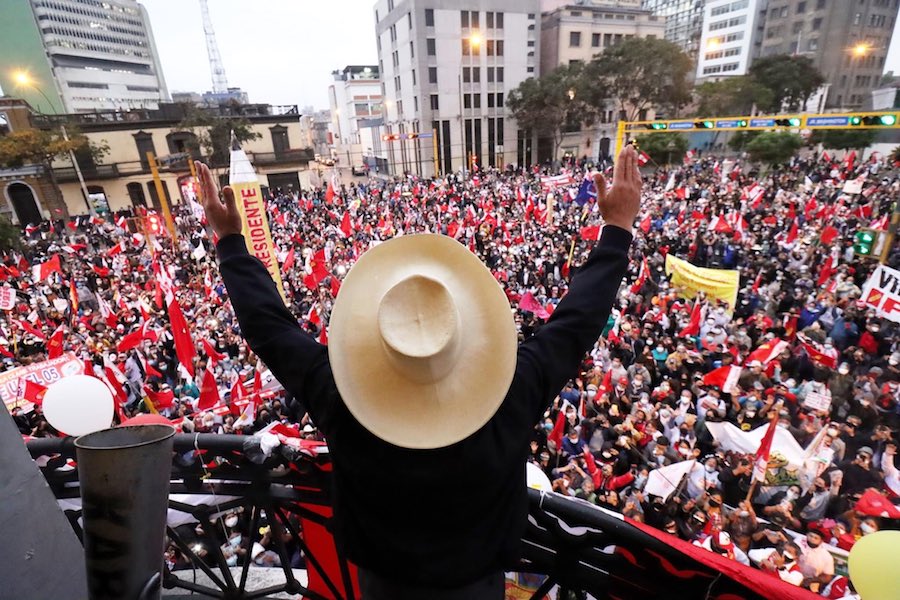Las Bambas standoff tests Castillo’s mining reform pledges

Peru’s new socialist government swept to power pledging to strike a new deal with the copper mining sector and redistribute profits to Andean communities like those around the huge Las Bambas project, owned by China’s MMG.
Those promises are now being tested, with protests and blockades at Las Bambas in the country’s south straining government negotiators, a reflection of wider tensions between indigenous communities and the key mining sector.
The government and one local community agreed a temporary truce last week after a three-week long road blockade of a key transport road in the region of Chumbivilcas almost led to a shutdown of the mine that produces some 2% of global copper.
But tensions remain high ahead of new talks this week, with threats of further blockades as critics say the leftist government of President Pedro Castillo has not lived up to its promises to voters in mining regions, who bolstered his campaign.
“They continue with the same system as previous governments,” Sixto Huamani, a leader in the province of Chumbivilcas, told Reuters by phone late last week.
Communities in Chumbivilcas had blocked a dirt road through the province, vital for transporting copper produced at Las Bambas before being loaded onto freight trains.
Peru’s Energy and Mines Minister Ivan Merino told Reuters in an interview that “short-term decision making” by MMG was partly to blame for the conflict and called for the company to help build a new train line to the mine to bypass the dirt road.
He added, however, that the conflict at Las Bambas was a reflection of wider mining tensions in Peru, the world’s second larger producer of copper behind Andean neighbor Chile.
“It’s not just in that area, there are tensions and expectations all over the country,” Merino said.
‘Resume the blockade’
Reuters spoke to Merino, community leaders, and joined meetings with officials to understand the precarious detente currently in place around Las Bambas.
Chumbivilcas leaders will meet with government and mining officials on October 5 in Lima, and are demanding a better road, compensation for land use, tax transfers, and jobs for locals.
Another group of leaders from Cotabambas, the province where Las Bambas is located, want a meeting a week later to resolve a standoff over how to redistribute copper taxes.
Either community could move to block the road again, leaders said. “If on October 5 we don’t reach agreements, the next day we resume the blockade,” Huamani told Reuters.
Finding a permanent solution for Las Bambas is a key test for Castillo’s two-month-old administration, whose ambition to fund bigger social programs depends on increasing the country’s mineral wealth.
The Las Bambas mine has been hit for years by protests from local groups who say mining profits bypass the region’s communities. They also say the many trucks that go through the dirt road each day scatter dust, which ruin their crops.
Castillo pledged to change that dynamic, with huge support in mining regions sweeping him into office in late July. During the campaign he railed against mining firms as “pillaging” the country’s wealth and promised to sharply hike tax rates.
Las Bambas says it has paid 4.9-billion soles ($1.2-billion) in taxes and royalties since 2014, and spent $235-million on upgrading the dirt road.
Castillo has yet to publicly comment on the road blockages. A spokeswoman for MMG declined to comment.
While the government proposes longer-term solutions like new train routes, communities are looking for shorter-term deals.
Last week, leaders from Cotabambas abruptly walked out of a meeting with government negotiators in Lima.
“This negotiation is just taking us for a ride,” Gonzalo Velazquez, the mayor of Haquira, a district in Cotabambas, said during the meeting attended by a Reuters reporter.
Castillo’s prime minister, Guido Bellido, is himself from Chumbivilcas and had said early in his tenure that he would find solutions for the Las Bambas conflict by the end of September, a deadline now passed with no permanent resolution in sight.
“Listen, Bellido, you have to respect Cotabambas!” community leaders chanted this as they walked out of the meeting with the government. Bellido did not respond to a request for comment.
(By Marcelo Rochabrun; Editing by Adam Jourdan and Aurora Ellis)
More News
{{ commodity.name }}
{{ post.title }}
{{ post.date }}




Comments